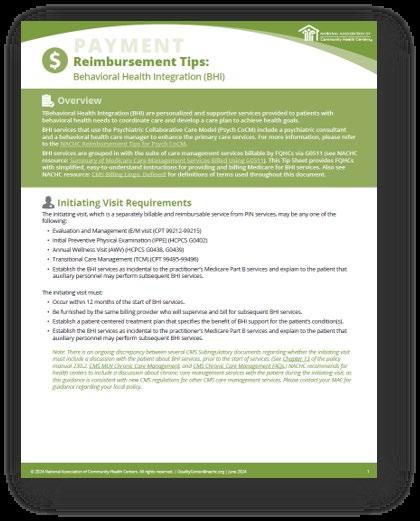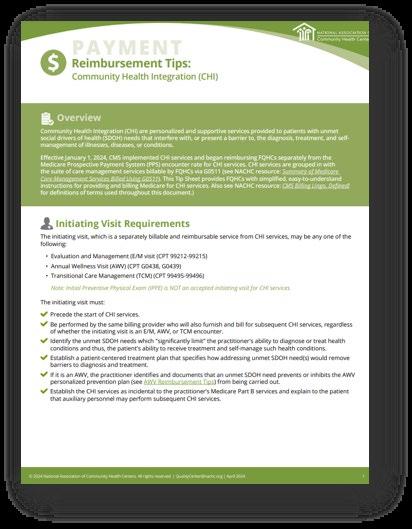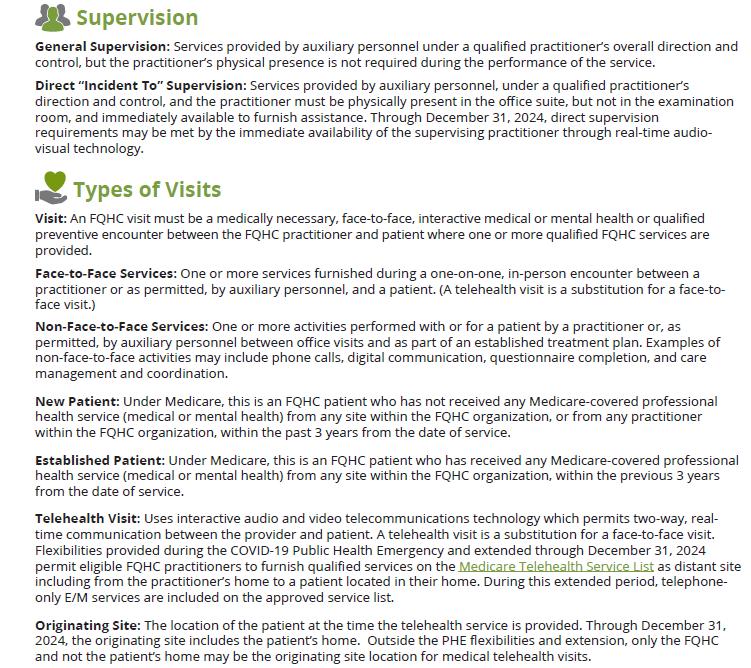Payment for Care Management Services
Health centers can obtain revenue above and beyond their federally-qualified all-inclusive Prospective Payment System (PPS) encounter rate for medically necessary, allowable care management services.
This additional revenue can help fund systems transformation as well as be an important part of a health center's value-based payment model.
Flip the page for a summary of Medicare care management services

Description
Chronic Care Management (CCM)
Personalized and supportive services provided to patients with multiple chronic conditions to coordinate care and develop a care plan to achieve health goals.
Complex Chronic Care Management (CCCM)
Personalized and supportive services provided to patients with multiple chronic conditions, who require moderate or high medical decision making, to coordinate care and develop a care plan to achieve health goals.
Principal Care Management (PCM)
Personalized and supportive services provided to patients with a single complex chronic condition to coordinate care and develop a care plan to achieve health goals.
Chronic Pain Management (CPM)
Personalized and supportive services provided to patients with chronic pain to coordinate care and develop a care plan to achieve health goals.

Initiating Visit Requirements
Not part of care management services; billed separately.
Any one of the following:
• E/M visit (CPT 99212-99215)
• Initial Preventive Physical Exam (IPPE) (CPT G0402)
• Annual Wellness Visit (AWV) (CPT G0438, G0439)
• Transitional Care Management (TCM) (CPT 99495-99496)

A face-to-face visit of at least 30 minutes in the clinical setting.
Behavioral Health Integration (BHI)
Personalized and supportive services provided to patients with behavioral health needs to coordinate care and develop a care plan to achieve health goals.
Any one of the following:
• E/M visit (CPT 99212-99215)
• Initial Preventive Physical Exam (IPPE) (CPT G0402)
• Annual Wellness Visit (AWV) (CPT G0438, G0439)
• Transitional Care Management (TCM) (CPT 99495-99496)
• Psychiatric diagnostic evaluation (CPT 90791) performed by Clinical Psychologist
(CHI)
Personalized and supportive services provided to patients with unmet social drivers of health (SDOH) needs that interfere with, or present a barrier to, the diagnosis, treatment, and self-management of illnesses, diseases, or conditions.
Personalized and supportive services provided to patients with a high-risk condition and healthcare navigation needs.
A patient’s use of devices to remotely assess and record physiologic data (e.g., weight, blood pressure, pulse oximetry, respiratory flow rate) outside of the clinical setting, usually in the home.
A patient’s use of devices to remotely monitor adherence and response to therapeutic treatment (e.g., respiratory, musculoskeletal) using nonphysiologic data outside of the clinical setting, usually in the home.
Any one of the following:
• E/M visit (CPT 9921299215)
• Annual Wellness Visit (AWV) (CPT G0438, G0439)
• Transitional Care Management (TCM) (CPT 99495-99496)
Note: IPPE is NOT an accepted initiating visit for CHI services
Any one of the following:
• E/M visit (CPT 9921299215)
• Annual Wellness Visit (AWV) (CPT G0438, G0439)
• Transitional Care Management (TCM) (CPT 99495-99496)
• Psychiatric diagnostic evaluation (CPT 90791) performed by Clinical Psychologist
Note: IPPE is NOT an accepted initiating visit for PIN services
Note: Initiating visit must be repeated annually for PIN services to continue.
No initiating visit required.


(Psych CoCM)
Eligible Patients
Chronic Care Management (CCM)
Patients who have:
Multiple (two or more) chronic continuous or episodic conditions expected to last at least 12 months or until the patient dies, or that place the patient at significant risk of death, acute exacerbation/ decompensation, or functional decline.
Complex Chronic Care Management (CCCM)
Patients who have:
Multiple (two or more) chronic continuous or episodic conditions expected to last at least 12 months or until the patient dies, or that place the patient at significant risk of death, acute exacerbation/ decompensation, or functional decline.
Moderate or high complexity medical decision making (MDM) required.
Principal Care Management (PCM)
Patients who have:
A single, high-risk complex chronic condition that is expected to last at least 3 months and places the patient at significant risk of hospitalization, acute exacerbation/ decompensation, functional decline, or death.
Chronic Pain Management (CPM)
Patients who have:
Persistent or recurrent pain lasting longer than 3 months.

Behavioral Health Integration (BHI)
Patients who have:
One or more new or pre-existing behavioral health or psychiatric conditions, including substance use disorder.
Authorized
Billing Providers
• Physician (MD, DO)
• Nurse Practitioner (NP)
• Physician Assistant (PA)
• Certified Nurse Midwife (CNM)
• Physician (MD, DO)
• Nurse Practitioner (NP)
• Physician Assistant (PA)
• Certified Nurse Midwife (CNM)
• Physician (MD, DO)
• Nurse Practitioner (NP)
• Physician Assistant (PA)
• Certified Nurse Midwife (CNM)
• Clinical Psychologist (CP)
• Clinical Social Worker (CSW)
• Mental Health Counselor (MHC)
• Marriage and Family Therapist (MFT)
Examples of Auxiliary Personnel

• Nurse (nurse care manager, Clinical Nurse Specialist (CNS), RN, LPN)
• Social Worker
No billable auxiliary personnel services.
• Nurse (nurse care manager, CNS, RN, LPN)
• Social Worker
Community Health Integration (CHI)
Patients who have:
Unmet SDOH need(s) interfering with, or present a barrier to, the diagnosis, treatment, and selfmanagement of illnesses, diseases, or conditions.
Principal Illness Navigation (PIN) Remote Physiologic Monitoring (RPM) Remote Therapeutic Monitoring (RTM)
Patients who have:
One or more high-risk condition(s) expected to last at least 3 months, which place(s) the patient at significant risk of hospitalization or nursing home placement, acute exacerbation/decompensation , function decline, or death.
May or may not have unmet SDOH needs.
• Physician (MD, DO)
• Nurse Practitioner (NP)
• Physician Assistant (PA)
• Certified Nurse Midwife (CNM)
• Physician (MD, DO)
• Nurse Practitioner (NP)
• Physician Assistant (PA)
• Certified Nurse Midwife (CNM)
• Clinical Psychologist (CP)
Established patients who have:
Acute or chronic condition(s) for which the authorized billing provider determines that RPM services are medically necessary.
Patients with an established treatment plan who have:
Acute or chronic respiratory, musculoskeletal, or other condition(s) for which the authorized billing provider determines that RTM services are medically necessary.
Transitional Care Management (TCM)

Psychiatric Collaborative Care Model (Psych CoCM)

Certified or trained:
• Community Health Worker
• Nurse (nurse care manager, CNS, RN, LPN)
• Social Worker
Certified or trained:
• Community Health Worker
• Nurse (nurse care manager, CNS, RN, LPN)
• Social Worker
• Peer support specialists (use CPT code for PIN-PS (peer support), PIN-PS activities are limited to behavioral health conditions, and do not include clinical care coordination)
• Physician (MD, DO)
• Nurse Practitioner (NP)
• Physician Assistant (PA)
• Certified Nurse Midwife (CNM)
• Physician (MD, DO)
• Nurse Practitioner (NP)
• Physician Assistant (PA)
• Certified Nurse Midwife (CNM)
• Clinical Psychologist (CP)
• Clinical Social Worker (CSW)
• Mental Health Counselor (MHC)
• Marriage and Family Therapist (MFT)
• Community Health Worker
• Nurse (nurse care manager, CNS, RN, LPN)
• Medical Assistant
• Clinical Pharmacist
Chronic
Care Management (CCM)
Billed once per calendar month after:
At least 20 minutes of services provided by auxiliary personnel.
Or
At least 30 minutes of services provided by the authorized billing provider.
Complex
Chronic Care Management (CCCM)
Billed once per calendar month after:
At least 60 minutes of services provided by auxiliary personnel and/or authorized billing provider per calendar month.
Principal
Care Management (PCM)
Billed once per calendar month after:
At least 30 minutes of services provided by auxiliary personnel.
Or
At least 30 minutes of services provided by the authorized billing provider.
Chronic Pain Management (CPM)
Billed once per calendar month after at least 30 minutes of services provided by the authorized billing provider, including:
• Administration of a validated pain rating scale or tool
• Patient-centered care plan
• Patient assessment and monitoring of their diagnosis and treatment
• Medication management
• Pain and health literacy counseling


• 24/7 access to clinical support staff
• Continuity of care with designated care team member
• Comprehensive assessment of medical, functional, and psychosocial needs
• Preventive care
• Medication management
• A comprehensive care plan created, monitored, revised, and shared with the patient/caregiver and other internal/external members of the patient's care team.
• Patient education and resources
• Care coordination
• Facilitation, coordination, and on-going communication with other necessary providers (e.g., behavioral health, physical and/or occupational therapy, home care)
• Facilitation for crisis care for chronic pain
Behavioral Health Integration (BHI)
Billed once per calendar month after at least 20 minutes of services provided by the authorized billing provider or auxiliary personnel (CPT 99484) or by CP, CSW, MHC, or MFT (G0323), including:
• Initial assessment and ongoing monitoring using validated clinical rating scales
• Behavioral health care planning in relation to behavioral/psychiatric health problems, including time spent modifying plans for patients who are not progressing or whose status changes
• Facilitating and coordinating treatment such as psychotherapy, pharmacotherapy, counseling and/or psychiatric consultation
• Continuity of care with a designated member of the care team
• Coordination with and/or referral to qualified providers for medication, E/M services, counseling and/or psychiatric consultation (G0323)


Community Health Integration (CHI) Principal Illness Navigation (PIN)
Billed once per calendar month after at least 60 minutes of services provided by certified or trained auxiliary personnel, including:
• Patient-centered assessment
• Coordination with home- and communitybased resources
• Health education
• Developing selfadvocacy skills
• Health care access and navigation
• Patient behavioral change facilitation
• Facilitate and provide social and emotional patient support
Billed once per calendar month after at least 60 minutes of services provided by certified or trained auxiliary personnel, including:
• Patient-centered assessment (PIN) or interview (PIN-PS)
• Identifying or referring patient (and caregiver or family, if applicable) to appropriate supportive services.
• Health education
• Developing self-advocacy skills
• Health care access/health system navigation
• Facilitating behavioral change as necessary for meeting diagnosis and treatment goals (PIN only)
• Facilitating and providing social and emotional support
Physiologic Monitoring (RPM)
Billed once per calendar month after at least 16 days of data have been collected in a 30-day period.
• Initial device set-up and patient education on the use of equipment.
• Device supply with scheduled recording(s) and transmissions
• The collection, analysis, and interpretation of digitally collected physiologic data.
• Management of a patient-centered treatment plan.
• CPT services 99457 and 99458 require at least one interactive communication with the patient during the calendar month, 20 minutes of authorized billing provider time.
Note: This is a summary of RPM service elements. Each RPM CPT code includes a unique set of service elements to be provided.
Therapeutic Monitoring (RTM) Transitional Care Management (TCM)
Billed once per calendar month after at least 16 days of data have been collected in a 30-day period.
• Initial device set-up and patient education on the use of equipment.
• Device supply with scheduled recording(s) and transmissions
• Review and monitoring of data related to signs, symptoms, and functions of respiratory or musculoskeletal system therapeutic response.
• Non-physiologic and therapeutic data can be patient self-reported and/or digitally uploaded
• Management of a patient-centered treatment plan.
• CPT services 98980 and 98981 require at least one interactive communication with the patient during the calendar month, 20 minutes of authorized billing provider time.
Note: This is a summary of RTM service elements. Each RTM CPT code includes a unique set of service elements to be provided.
Psychiatric Collaborative Care Model (Psych CoCM)
Examples of CoOccurring Services****
May be provided and billed for in the same calendar month
• 99490
• +99439
• 99491
• +99437
99487
+99489
99424
+99425
99426
+99427
G0511: $72.90
• TCM (Transitional Care Management)
• BHI (Behavioral Health Integration)
• CHI (Community Health Integration)
• RPM (Remote Physiologic Monitoring)
• RTM (Remote Therapeutic Monitoring)
• Psych CoCM (Psychiatric Collaborative Care Management)
• TCM (Transitional Care Management)
• BHI (Behavioral Health Integration)
• CHI (Community Health Integration)
• RPM (Remote Physiologic Monitoring)
• RTM (Remote Therapeutic Monitoring)
• Psych CoCM (Psychiatric Collaborative Care Management)
• TCM (Transitional Care Management)
• PIN (Principal Illness Navigation)
• RPM (Remote Physiologic Monitoring)
• RTM (Remote Therapeutic Monitoring)
• TCM (Transitional Care Management)
• CCM (Chronic Care Management)
• PIN (Principal Illness Navigation)
• RPM (Remote Physiologic Monitoring)
• RTM (Remote Therapeutic Monitoring)
G0323


• TCM (Transitional Care Management)
• CCM (Chronic Care Management)
• CCCM (Complex Chronic Care Management)
• CHI (Community Health Integration)
• RPM (Remote Physiologic Monitoring)
• RTM (Remote Therapeutic Monitoring)
Community Health Integration (CHI)
• G0019
• +G0022
Principal Illness Navigation (PIN) Remote Physiologic Monitoring (RPM) Remote Therapeutic Monitoring (RTM)
• G0023
• +G0024
• G0140 PIN-PS
• +G0146 PIN-PS
• 99453
• 99454
• 99457
• +99458
• 99091
• 98975
• 98976
• 98977
• 98980
• +98981
• TCM (Transitional Care Management)
• CCM (Chronic Care Management)
• BHI (Behavioral Health Integration)
• Psych CoCM (Psychiatric Collaborative Care Management)
• TCM (Transitional Care Management)
• PCM (Principal Care Management)
• BHI (Behavioral Health Integration)
• Psych CoCM (Psychiatric Collaborative Care Management)
• TCM (Transitional Care Management)
• CCM (Chronic Care Management)
• CCCM (Complex Chronic Care Management)
• PCM (Principal Care Management)
• BHI (Behavioral Health Integration)
• CPM (Chronic Pain Management)
• Psych CoCM (Psychiatric Collaborative Care Management)
• TCM (Transitional Care Management)
• CCM (Chronic Care Management)
• CCCM (Complex Chronic Care Management)
• PCM (Principal Care Management)
• BHI (Behavioral Health Integration)
• CPM (Chronic Pain Management)
• Psych CoCM (Psychiatric Collaborative Care Management)
Transitional Care Management (TCM)


Psychiatric Collaborative Care Model (Psych CoCM)



Community Health Integration (CHI)
Principal Illness Navigation (PIN)
Remote Physiologic Monitoring (RPM)
Remote Therapeutic Monitoring (RTM)
Transitional Care Management (TCM)


CHI Reimbursement Tip Sheet PIN Reimbursement Tip Sheet RPM, RTM Reimbursement Tip Sheet

Psychiatric Collaborative Care Model (Psych CoCM)




